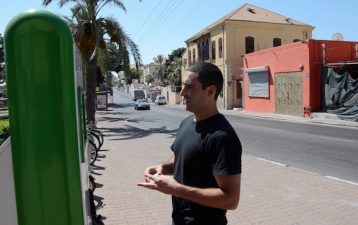Human-powered, pedal-driven, single-track, two-wheeled bikes are emerging as the most disruptive tech in transportation. Now China’s top two dock-less bike-sharing titans are rolling into Startup Nation with plans to deploy thousands of bikes in Tel Aviv in the first half of 2018, threatening existing stationed bike platforms like local provider Tel-O-Fun.
Dock-less bike-sharing platforms allow riders to pick up and return bikes virtually anywhere, instead of at designated dock (or stationed) locations. Using an app, riders can find the nearest bike, unlock it using a scan code, and once they are finished riding leave it at any public place as long as it doesn’t block traffic or pedestrian walkways.
Compared with the existing Tel-O-Fun bikes, ofo’s bike is lighter, has three gears, and is designed for the rough streets of Tel Aviv. The bike’s wheels are made of solid rubber, eliminating the risk of flat tires.
In less than 18 months, Mobike and ofo, have become the fastest startups to produce valuations of $3 billion each, according to CB Insights. Last October, ofo launched 200 bikes on the Bar-Ilan University campus, with plans to deploy at least 1,000 more in Israel by end of June. Mobike announced in January that it would partner with Israeli car sharing company Car2Go Ltd. to launch service in Tel Aviv. That service launched this week.
“Many people don’t realize that there is a bike-sharing revolution underway,” Imri Galai, general manager of ofo’s Israel operations, told Times of Israel, adding that station-less bikes are the next frontier in the sharing economy.
The number of bikes used by municipal bike-sharing systems increased more than 55 percent worldwide in 2016 compared to 2015 figures, according to the Bike-Sharing blog, a website that manages and tracks global data about bike-sharing schemes.
Dock-less bike apps are becoming a popular alternative to the existing stationed bike platforms because they solve the “last mile” problem in the transportation industry. “The last mile” is the distance that users of public transit need to walk to get to or from their trains and bus stations.
“Nobody thought that station-less bikes were going to be able to solve this problem when they were first launched, but they are quickly becoming a part of transportation landscape,” said Lihong Zhang, senior lecturer at the Liverpool Business School of Liverpool John Moores University, who researches public bike-sharing and other mega-transportation systems and designs.
Cities spend millions implementing a traditional docked bike-sharing system. The average capital expense of installing one bike ranges from USD$3,000 to USD$5,000, depending on the city, according to a study by Pew research. Based on these estimates Tel Aviv could have spent between USD$6 million to USD$10 million installing the infrastructure and docking stations.
In addition, there are other long-term costs such as adding docking stations and re-balancing or placing the bikes back at their original locations after they are used.
“Just re-balancing the docked bikes to different stations alone requires people working three shifts 24 hours a day. Bike apps like ofo are a zero-cost solution for cities and municipalities, with no installation costs for docking stations or long-term maintenance expenses,” Galai said.
Funding for these programs usually comes out of the city’s budget, with taxpayers ultimately carrying the burden of the shortfall in profits.
Tel Aviv’s existing docked bike-sharing platform, which consists of 2,000-plus aluminum bikes and 211 docking stations, has seen a steady decline in the number of users from 9,000 riders per day to 4,000, according to data from FSM Ground Services Ltd. (FSM), the company that services the system. FSM said in a statement that the decline has been primarily due to the introduction of the electric bike, along with other issues.
Compared to the Tel-O-Fun, which charges a minimum access fee of NIS 17 ($4.9) and additional NIS 6 for one hour of use, ofo does not charge an access fee and costs an average of NIS 3 for 30 minutes of use. FSM has a ten-year contract with the municipality and does not plan to make any changes to its fees or program at this time.
“Israelis are very selective, and if there is a superior product, they will use it. When there is a better way to travel they will adapt to it,” said Erel Avineri, associate professor at AFEKA, Tel-Aviv Academic College of Engineering, who leads the college’s Center for Infrastructure, Transportation, and Logistics.




One thought on “Chinese invade Israel…on bikes!”
Comments are closed.